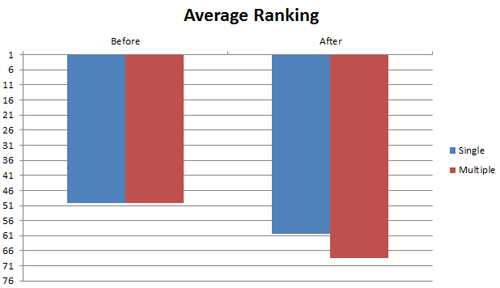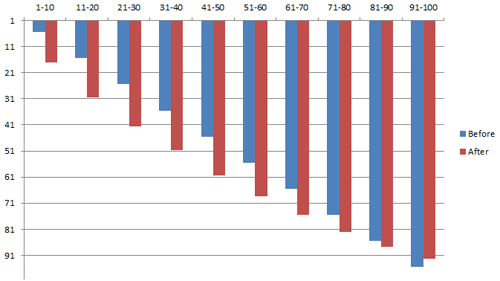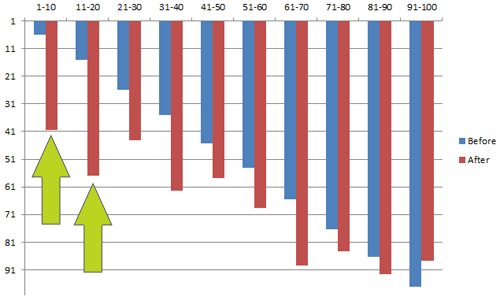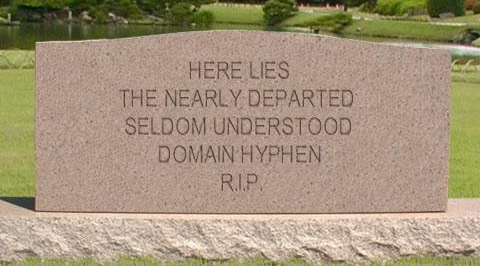About a month ago I published some research into the Google EMD update and it’s effect on exact and partial-match domains in the UK SERPs. If you have’t read that yet then I suggest you pop over there first for some background. It’s OK, I’ll wait.
One of the questions that got asked more than once after the data was made public was how the update had affected hyphenated domains in general and not just EMD/PMDs. Anecdotally I had noticed various sites dropping rankings around the same time so it was definitely something I wanted to investigate. Luckily - I finally had some spare time on Friday to run some data.
The Process
I used the same dataset as I used in the previous research - a random slice of 5000 keywords that we track within our Floodlight platform. This time I was looking for any result that met the following criteria:
- Domain contained at least one hyphen
- Domain was NOT an EMD or PMD for the keyword
I wanted to make sure that nothing targeted within the EMD update should have had any impact on these numbers, hence the negative match on EMD/PMD domains. Essentially I wanted to just look at domains that had no major keyword connection but happened to be hyphenated. I also split them into two buckets; domains with a single hyphen and domains with multiple hyphens.
As I said in my last post, I’ve tried to be as specific with the timeframes as possible to try and pinpoint the EMD update only but it’s worth mentioning again that there were Panda and Penguin refreshes around this time too. It’s no stretch to assume that hyphenated domains are more likely to be low quality and therefore could also be the type of sites being targeted by the black and white animals so there is nothing 100% conclusive here.
To Hyphen or not to Hyphen?
So as I mentioned above, I split the data into two distinct buckets - single hyphens and multi hyphens. The results are fairly interesting once we start digging deeper although on a top level seem fairly bland. Here’s the average ranking position of the two buckets before and after the update:

Starting positions are very similar - #50.2 for single hyphens and #50.3 for multiple-hyphens, being slap bang in the middle of our 1-100 rankings suggests very little positional bias before the update. Afterwards however is a different story with drops to #60.4 (20%) and #68.5 (36%) respectively.
Single Hyphen Change Based on Starting Position
As in my previous post I then split my two main buckets into 10 smaller buckets based on starting position of the ranking URL. Here is what the drops looked like for single hyphen domains:

A pretty linear pattern with those results on pages 1-4 likely to have experienced the biggest percentage drops. This is fairly similar to the PMD drops we saw last time, which would make sense seeing as many of those were also hyphenated.
Multiple Hyphen Change Based on Starting Position

Eek! huge drops for those domains previously ranking in the top 20, and still massive movement for those between 20-40.
Case Study: ditching the hyphens
I won’t mention the domain as we’re still running the test, but we had a site with two-hyphen domain that was ranking very nicely for a bunch of keywords in it’s market prior to the EMD update. This was not some crappy thin affiliate site, it’s a brand selling a physical product with a fair amount of ‘buzz’ around it. The domain itself is the brand name, but it could also be classified as a PMD for one or two of its target terms. The site suffered significantly all round, and not just on those terms where it could be a PMD.
Recently, as a test, we switched the domain from brand-keyword-keyword.co.uk to brandkeyword.co.uk. Results are too fresh to share at the moment but early indications are looking pretty good. The new domain has recovered significantly, and while not quite bouncing fully back to it’s initial rankings, I think it’s a only a matter of time. I’ll update this post a bit further down the line to see if it sticks or not.
So, Hyphens: yes or no?
Based on this research, I would say that my gut feeling is that Google has started using hyphens in domain names as some kind of negative signal/classifier. If somebody asked me today whether to use a hyphen or not for a new venture I would definitely say look for a non-hyphenated domain. If you’re currently running on a domain with hyphens and experienced widespread drops that you can’t attribute to a Panda/Penguin slap then I would suggest you engage somebody who knows what they’re doing to dig a little deeper for you. Chances are they’ll uncover some issues that you weren’t aware of but if you can’t pinpoint any other cause then, who knows, it just might be your domain name.
And finally - yes this post is a little sensationalist and yes lots of these domains are likely low quality sites (I may re-run the results and factor in Moz DA at some point). But regardless, it’s some interesting data that’s clearly no edge-case and had to be shared. Try not to jump to any rash decisions.












I think if you have more than 1 hyphen inside your domain it’s a problem. Having just one it’s ok, and it doesn’t look bas to Google
Right now, I’m not entirely sure. Bear in mind that this is across 5000 keywords - I think there’s too much evidence to show that even single hyphenated domains have been negatively impacted.
that would be a nice solution
Wild - makes sense though. There is a general correlation between shitty websites and the number of hyphens the domain has, makes sense that G would toss that into the algo. I feel like this is a shortcut and expect many good sites being affected by it, but think that this would improve SERPs overall.
Great findings, definitely something to keep in mind when buying a domain.
-Oleg
Hey Ben, great analysis! So would you advocate mykeyword.com over my-keyword.com?
Perhaps there was a skew against hyphenated because (the non-crappy affiliate site not withstanding) hyphenated domains tend to more commonly be keyword rich vs a single word domain which tends to be a brand?
Hey Chris - good to hear from you!
Yeah I think that’s a fair assumption to make - hyphenated domains are definitely more likely to be keyword focused, and also more likely to be poor quality because of that very thing too. Correlation is not causation of course, but it’s an interesting trend nonetheless.
Ref the domain - yes I would recommend mykeyword.com over my-keyword.com (but then again, I probably would have said the same thing before too).
Sad to read this, as i am having some nice EMDs with hyphens. We have the rollout of the update in Germany just in front of us.
Greetings
Hello there.. I have had some great successs with emd’s in the past.
I have just bought a ten year old domain name with all my keywords within
And 3 hyphens, domain - business-for-sale.co.uk
The site will be selling real businesses and has archive going back over 9 years!
What’s your views on this ? I have paid and spent thousands on other emds before and have provne to be a great success - this is my first time with a hyphen domain.. I am hoping a age factor will help ?
I don’t see any history on that domain - it looks like it’s just been parked on sedo for years.
Like I said above though, with all other things being equal, I would rather work to build out a brandable non-hyphenated domain than a keyword stuffed hyphenated one.
Just seen this post. Did the domain fully recover in the end? I saw similar drops from a double hyphenated domain (all brand name, no keywords) and 301ed it to the non hyphenated version. We saw an initial recovery but then the domain got hammered again around the time of a panda update. Could be 2 separate issues obviously.
Sorry for the slow reply, I missed these more recent comments.
So the domain didn’t fully recover, but it recovered enough to say it was a win. It’s been improving more and more over time but we can’t attribute that to the domain change as there’s been other activity too.
Ben, you have switched the domain from brand-keyword-keyword.co.uk to brandkeyword.co.uk. Do you mean you have used 301 redirection?
Correct, yes.
The crappy thing about this update is that I read extensively about SEO before choosing numerous domain names, including some with hyphens. I also watched a video by Matt Cutts saying that hyphens do not hurt rankings at all. I was trying to follow their advice when I chose the domains. So whether they are good or bad (from a desirability standpoint) should really be irrelevant when they have told people who purchased domains following their advice that the hyphens would not hurt their site. So they shouldn’t just change the game whenever they see fit and go against their own previous statements, upon which many people reasonably relied. So in my view the debate shouldn’t be about whether they are desirable or not, as if the Internet and Google just appeared yesterday and we are deciding these things for the first time. The real debate and issue is whether Google should say one thing, have people spend their hundreds or thousands of hours of their lives working within the rules set by Google, only to have Google change the rules on an issue that isn’t easily remedied. I mean, I suppose I could do the however many ridiculous number of hours that it would take to move these sites to entirely new domain names, not to mention the money spent on the original domains. But then the new domains wouldn’t have the same age. Google’s tactics are pretty bad and I hope they get sued and soon.
I’m designing my own law fim site now, as a solo practitioner. I’m noticing that the hypen keywords are getting some of the highest rankings. I bought a bunch based on what I see on Google first page for key words. Would you have any idea why hyphen domains for lawyers are actually SEO gold?
I doubt that the hyphens in this instance are having any positive bearing on rankings (it would only ever realistically be a neutral or negative signal). It may just be that they were good quality domains that have weathered all the recent algo updates.
What if I already have a single hyphen in my domain, what should I do? I just started blogging in April…Thanks
What if I already have a single hyphen in my domain name, what should I do? I just started my blog in April..
Great article that isn’t just opinion. Thank you for taking the time to do this.
Thanks Ben for very useful article and your research. It really helps. I was just recently thinking about hyphen or mykeyword.com domains.
I recently bought few domain with hyphen as the non hyphen domain were already taken up and I fell unfortunate that I am readying the article now, my question is :
If all the non hyphen domain names are already taken up related to your brand/topic what would be the ideal approach to go for hyphen based or some other domain without the relevant keyword in it.
For e.g. I tried for http://www.2014elections.com/ but was already taken up so I went for http://2014-elections.com . Was this a right decision? Or whether I should have gone for 2014elec.com
This will help in making better decision next time.